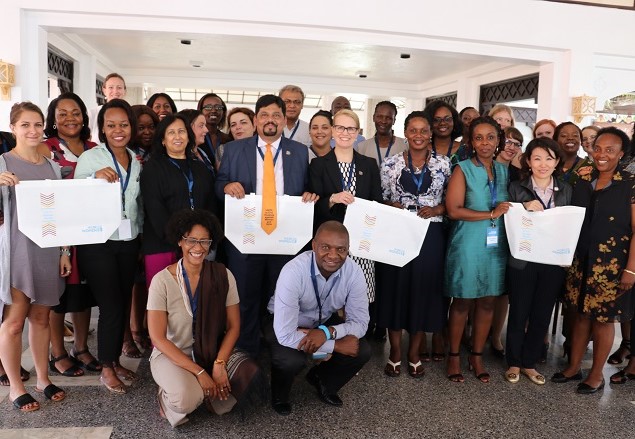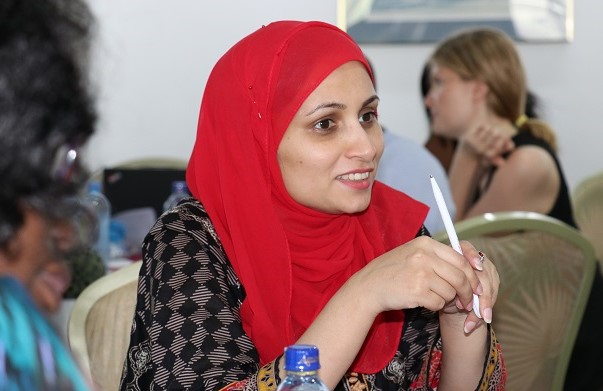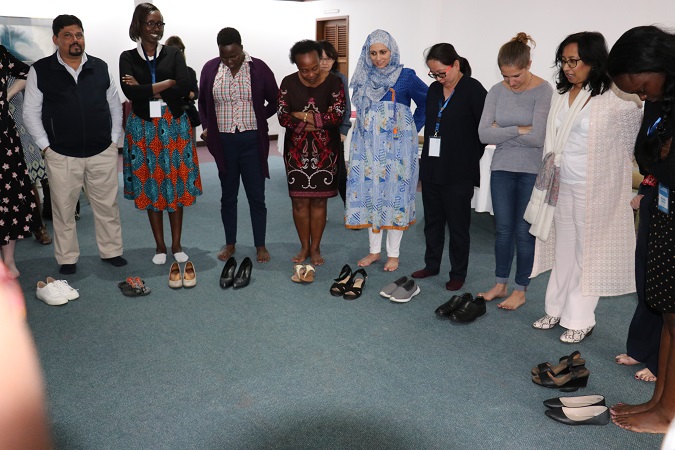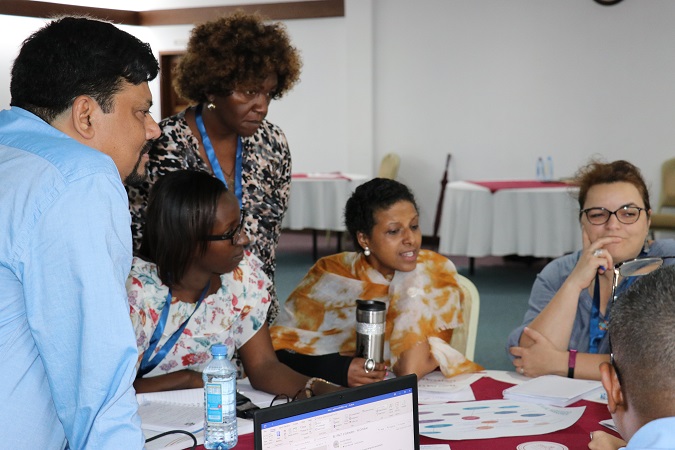UN System Geared to Promote Gender Parity and Prevention of Harassment and Exploitation at the Workplace
The participants were drawn from humanitarian work to PSEA, administration, strategic planning, operations management, programme officers and analysts, co-ordination, youth and WPS work and protection officersDate:
UN Women Eastern and Southern Africa Regional Office (ESARO) reported the Status of Women in the UN Duty Station in Nairobi in 2018. As a follow-up to the Report on the status of women in United Nations Office in Nairobi and to promote increased understanding and accountability in the UN System on Gender Parity, Sexual Harassment, Sexual Exploitation and Abuse, the UN Women ESARO in partnership with the UN Women Headquarters organized a training of trainers (ToT) program for the UN sister agencies’ staff from the East & Southern Africa region.

Group photo of participants who attended the Gender Parity and Prevention of Harassment and Exploitation at the Workplace ToT. Photo: UN Women/ Faith Bwibo
The Gender Parity, SH and PSEA ToT drew participants from UN Women offices in the region as well as from other UN agencies. Countries represented included Ethiopia, Kenya, Malawi, Mozambique, Somalia, South Sudan, Sudan, Rwanda, Tanzania, Uganda and Zimbabwe. The participants were drawn from humanitarian work to PSEA, administration, strategic planning, operations management, programme officers and analysts, co-ordination, youth and WPS work and protection officers. This mix of participants from various countries representing diverse fields allowed many experiences and understandings to have a place in the discussions, as well as a collective exercise in how to move forward.
Secretary-General’s priorities: Gender Parity and Zero Tolerance
The Secretary-General launched the UN System-wide Strategy on Gender Parity in September 2017. According to the Secretary-General, “this goal is not just about numbers, but about transforming our institutional culture so that we can access and capitalize on our full potential. It is about creating a working environment that embraces equality, eradicates bias and is inclusive of all staff”. Such institutional culture is constructed, shaped, and molded by our policy, regulations and practices, as well as our day-to-day behaviors. In this regard, UN Women developed the Enabling Environment Guidelines for the UN System and the Supplementary Guidance which showcase good practices and recommendations for the entities to take forward. The Enabling Environment Guidelines are divided into three sections including 1) workplace flexibility, 2) family-friendly policies, and 3) standards of conduct.

Sidra Anwar, Protection Officer from UNHCR Rwanda participates during the workshop. Photo: UN Women/ Faith Bwibo
The Secretary-General also emphasized on the Zero Tolerance Policy and said, "As we serve the world's people and work for peace and the advancement of humanity, the United Nations must be a source of inspiration and a beacon of hope for all. Together, let us solemnly pledge that we will not tolerate anyone committing or condoning a crime, particularly, crimes of sexual exploitation and abuse. Let us make zero tolerance a reality".
In her opening observations, UN Women Deputy Regional Director Zebib Kavuma urged the participants to forge ways of ensuring commitment and effective coordination to operationalize the existing strategies for promoting gender parity and ending Sexual Harassment, Exploitation and Abuse in the UN system. She emphasized the importance of reporting of cases of sexual harassment. ‘There needs to be an honest and open dialogue, without fear of retaliation,’ she added.
Gender Parity, Enabling Environment Guidelines and addressing SH-SEA
The four-day training started with two days on gender parity and the enabling environment and then turned to sexual harassment and its links with sexual exploitation and abuse. The two elements had good complementarity and continuities.

The lead facilitators Katja Pehrman and Purna Sen shared the policy frameworks quoting good practices with regards to Gender Parity and prevention of sexual harassment respectively. Expectation mapping revealed that participants wished to better understand the concepts of gender parity and sexual harassment, and how to operationalize and promote enabling environment in support for achieving gender parity. Emphasis is also laid on operationalizing the frameworks for prevention of sexual harassment efforts at country level, learn about good practices and how to change the organizational culture.
The ToT was conducted using interactive approaches and provided strategic guidance, among others on the normative framework for Gender Parity, the Enabling Environment Guidelines, monitoring and reporting, SG’s System-wide Gender Parity Strategy, United Nations Resolution Committing to Zero-Tolerance Policy on Sexual Exploitation throughout United Nations System. The training on Sexual Harassment also focused on victim centered approach in handling cases of sexual exploitation and abuse and the new whistle‑blower policy. The role of Gender and PSEA Focal Points, as well as field-specific examples on the implementation of these policies and guidance through collective efforts of the UN System at various levels is highlighted throughout the ToT.
In her remarks on the importance of organizing such a workshop, Katja Pehrman, Senior Advisor and Focal Point for Women in the UN System remarked that ‘the TOT was pertinent with a view to the SG’s priority to focus on parity efforts in the field. It also served as the first follow-up mission to monitor and guide the implementation of the Enabling Environment Guidelines in the field.’ Purna Sen, Executive Coordinator and Spokesperson on Addressing Sexual Harassment and other forms of Discrimination stated, ‘There are promising practices that are evolving and there is increased awareness and accountability demonstrated by staff at all levels in addressing sexual harassment, exploitation and abuse. However, there is much needs to be done’, she emphasized.

UN Women’s Regional Program Manager for Ending Violence against Women (EVAW) Syed Sadiq, commented that ‘The ToT addressed the needs of staff for building the knowledge base, common understanding and approaches to promoting gender parity and eradication of sexual harassment, exploitation and abuse within the UN System. It helped in taking the global policy frameworks to the field and the call for action’, he added.
The ToT participants acknowledged the unique momentum to discuss how to best use the Enabling Environment Guidelines. They also explored frameworks and practices for eradicating sexual harassment and other forms of violence against women at the workplace. ‘This training was an eye opener for me. I have learnt a lot, which I am going to apply in my daily work and take back to my office and colleagues’ commented Mildred Anyango, participant from ICAO. Hodan Addou, UN Women Tanzania Representative observed “A lot of staff members, youth and the community lack knowledge on SH and PSEA, this ToT has been helpful and now we can replicate similar trainings in the field”.